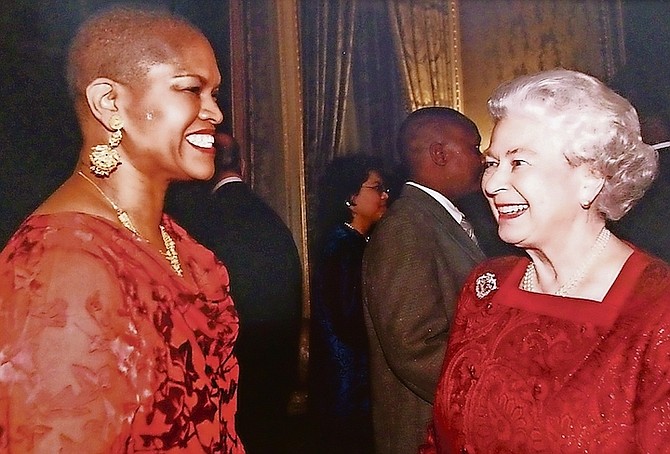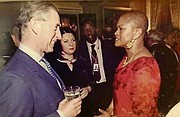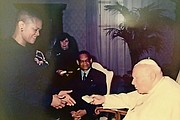By FELICITY DARVILLE
THERE was a time when a Bahamian woman bearing 16 children would not be nearly as shocking as it would be today. Back in the day, large or rather, huge families were commonplace.
Despite their size, these families were close knit, in some cases, even more close knit than much smaller ones today. Sticking together and relying on each other was a means of survival. Loving and caring for one another was a choice – and these things made for formidable families with legacies that have stood the test of time. The Sherman family of Bain Town is one of them.
Missouri Sherman-Peter was born the 15th of the 16 children of John Alfred Sherman and Effie Sherman (nee Lafleur), and she was the last girl born to them during their 32 child-bearing years.
The family homestead was located opposite what is now the University of The Bahamas (UB) on a property that ran from Hutchinson Street across Eneas Lane. The home had only one bedroom. All the girls slept in that room with their parents, while the boys lived in a small, separate house in the yard.
Missouri never saw a stove in her parents’ house until she was a teenager. She and her sisters would go to the area where The Nassau Guardian now stands to collect firewood for their outdoor kitchen, toting it atop their heads in a fashion that she says led to their excellent posture today. The neighbourhood had family, as her aunts lived on a property where Britley’s restaurant sits off Poinciana Avenue today.
Missouri recalls a tight-knit unit with family values that pulled them through the toughest of times.
“We lived a very difficult life," she told me. "Everything was handed down from one child to the next – all of our clothes, shoes (and other children at school would tease us for it). Everything was handed down except the brain – you had to have one of your own.
"My parents were hard-working; they did not have much education, in fact my father never had any education in his life. But it was very important to them that we took our education seriously. My parents focused on God, community and their children.
"Education was so important that they never let us miss school. Back then, a stranger would come to your home and read your report card… there was no chance of someone faking a good report for you. I remember when I had the opportunity to go to Queen’s College – that was very unusual in those days. The night before I went to school there, our yard was full of neighbours, family and friends. Everyone was so happy for me and they were encouraging me. This was a moment of pride not only for my parents, but for everyone because not many black people had the opportunity to attend school there.”
In addition to focusing on their education, the Sherman children also had to work. Everyone in the family had a job and the parents expected their children to do it. Missouri was eight when she got her first job as a babysitter, and she took care of the child from when she was eight until she was 12 years old.
As the older children graduated and got jobs in the real world, they were responsible for assisting with the rearing and financing of the younger children – a responsibility they took seriously. Missouri’s older brother George (Dr. George Sherman, the Bahamas’ first obstetrician) was the one who brought her home from the hospital. Back then, without a car, they had to walk home to Bain Town from the hospital on Shirley Street. George carried the newborn on his shoulder for his mother. Later in life, he would purchase Missouri a property and build her a home, paying off half of the mortgage for her.
Missouri said the Sherman siblings understood the value of togetherness.
“Whenever we were going to school and coming home, there was always a bunch of us," she recalled. "So, when other children were not kind to people like us with no means, and would say things like, ‘We are better than you’, it did not matter to us because we had each other. What made it better for us is that people of Bain Town appreciated us for how we were, as they always saw us in a large group together.
"We did have fun times growing up. I could remember our moonlight dances. With no electricity, when the moon was big and bright, we would go outside and have ‘jump-in’ dance and play ring play with songs like, ‘Brown Girl in the Ring’. The Cat n’ Fiddle (a popular nightclub for tourists and locals) was right around the corner from us. Bain Town kids would climb the wall and get on the roof and watch the sights and scenes and performances, as it was an open-air club. If your parents caught you, you would be in trouble.
"Some nights, we would go crabbing in the area where UB is now – I learned to catch crabs there; so that spot has always been an area for education, even way back then.”
Missouri graduated from high school and then studied at the University of the West Indies (UWI), where she obtained a Bachelor of Arts in History with special honours. Once complete, she was gearing up to be a teacher and she looked forward to a life educating children.
However, as a civil servant, the government had a different assignment for her. She and two others were chosen by Government Minister Paul Adderley to go into the foreign service, with a goal of setting up a Bahamas mission to the United Nations (UN). She was surprised, but excited to learn that she would be sent to New York City to work for her country.
She started off with a bang and because of it, she was entrusted with the job of opening the official Bahamas Consulate in New York, while just in her 20s with a young baby in tow. She took her work seriously and because of it, she continued to grow from strength to strength – understanding diplomatic relations, working on treaties that would benefit her country, and producing well-defined reports to Bahamas Government officials for plans of action.
“He was firm and strong, and he would tell you what he expected of you, and he expected you to produce,” Missouri said of Minister Adderley.
“You were always on your tippy toes with him and he would tell you exactly what he liked about what you did and what he didn’t. I had helped to set up the Bahamas Mission and I was going back home. Mr Adderley told me I would be staying and helping to set up the official Bahamas Consulate in New York. He and Minister Carlton Francis are among my mentors, because they believed in me and entrusted me with great responsibility.
"It was a time (just post-Independence, when young people were given a time to shine in their talents and help build the country). Franklyn Wilson and then Foreign Affairs Minister Charles Carter also had a lot of confidence in me and it was incredible. They allowed you to advise them and they took your advice. I remember when Mr Adderley and I were attending a session at the UN and I suggested to Mr Adderley that The Bahamas needed to go to CHOGUM to the Commission on Narcotics to tell our own story.
(This was in the 1980s during a major drug trafficking wave, and The Bahamas remained an ocean passageway for transshipment to the United States. I told him that CHOGUM meets every year and they talk about The Bahamas, and we needed to be there to discuss our own matters and problems. That was in 1982. He put me on that Commission and I sat on it for over a decade.”
“I am a Diplomat servant to the world and The Bahamas,” Missouri told me.
“You are doing your work for the good of the entire world, but always with your own country in mind. In multilateral relations, we are working for the betterment of people and countries across the globe. In bilateral relations, you are working on the relations between another country and your own. So, the work of Diplomacy is for your country and the world.”
Having given more than 40 years of dedicated service in Diplomacy, Missouri has been attempting to retire for quite some time, hoping to spend even more time in her home in Nassau, and spend even more quality time with her sons, Sebastian, Jr, and Senaka. However, she keeps getting called back into service.
After her initial retirement, she was sent home to serve as an advisor to the Ministry of National Security. She led the drafting of a National Action Plan and guidelines for Trafficking in Persons. Once she had completed her national mission, CARICOM came knocking and she could not say no as it was this body that provided countless documents of useful information and research to back her work throughout the years.
Currently, she is back in New York City, working as a Permanent Representative for CARICOM, a work that makes her proud and seems a fitting way to end her career. She is currently writing her memoirs in a book: “Ordered Steps of a Woman in Diplomacy”.
A consummate Ambassador, Missouri has written on a wide range of subjects which appear in publications such as the UN Bulletin on Narcotic Drugs: “Swords into Ploughshares, Building Peace through the United Nations”. She has served as Consul General, New York, Deputy Permanent Representative to the United Nations; High Commissioner to Canada; non-resident High Commissioner to Zimbabwe; and Permanent Secretary for the Ministries of Foreign Affairs, National Security and Office of the Attorney General. She has helped to oversee elections and lectured at academic institutions all over the world. She holds a Masters Degree in International Affairs from Columbia University, New York; an Honorary Doctorate of Laws from UWI; an Award of Honour from the International Council on Alcohol, Lausanne, Switzerland; and the International Woman of Courage Award from the United States Embassy. Missouri even earned a prestigious Papal Medal from Pope John Paul II.
Of all her achievements, she is most proud to have received the Hero of Bain Town award from Rev CB Moss. She is proud of her roots and whenever she is in Nassau, she still takes a stroll through Bain Town. She is proud of her upbringing and notes that her parents produced a fine cadre of children, including two doctors, a Royal Ballet dancer, three who were cooks for the rich and famous, and two who taught medicine, and herself as an Ambassador for her country.
“By the Grace of God, we did exceptionally well,” she shared, “Our parents had hope and faith in us and worked so hard for us – God gave them their wish.”








Comments
Use the comment form below to begin a discussion about this content.
Sign in to comment
OpenID